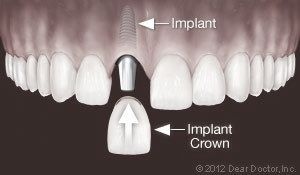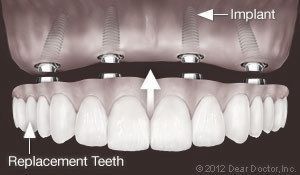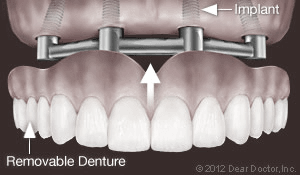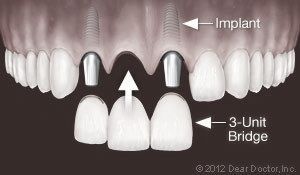Enhance Your Smile With Our Dental Implants
Modern dentistry has several options to replace missing teeth, using removable partial dentures, fixed bridges, and dental implants. Of these options, dental implants are by far the best. A dental implant is a small screw-shaped titanium post that replaces the root portion of a missing tooth. During a minor surgical procedure using only local anesthesia, your dental implant is inserted directly into the jawbone in the space left by the missing tooth. It will then be left to heal for a period of months, allowing the bone to fuse around the implant, making it secure and stable. After the healing period, the implant is topped with a lifelike crown, custom-made to match your existing natural teeth. Implants have a documented success rate of over 95%, which is significantly higher than any other tooth-replacement option. Implants also help preserve the bone that naturally deteriorates when a tooth is lost. With proper hygiene and care, a dental implant can last a lifetime.
Replace One Tooth
When you have one tooth missing, a single implant is inserted into the bone to replace the root portion of that tooth, which will later be topped with a crown to simulate a natural tooth. Even if the initial cost is slightly higher than other options, implants have the highest success rate, making it the best long term investment for replacing a missing tooth. Additionally, an implant will never decay or need root canal treatment, and it feels just like the tooth that was there.
Replace Multiple Teeth
If you have multiple missing teeth, you may not need an implant for each missing tooth. If the missing teeth are consecutive (in a row), implants can act as supports for fixed bridgework. For example, if you are missing three teeth in a row, we can place two implants, one on either side of the gap and a crown in between that has no implant underneath. In this scenario, you will not need to use any of your remaining natural teeth as bridge supports, thereby preventing them from weakening and incurring decay.
Replace All Teeth Permanently
Implants can support an entire arch of upper or lower replacement teeth that are fixed into the mouth and are never removed. Sometimes the new teeth can be supported by as few as 4 implants. This is comparable to the structure of a table, which only needs 4 legs to hold it up. In cases where jawbone density and volume have deteriorated, 5 or 6 implants might be needed to support a row of 10 to 12 teeth. Dental implant replacement teeth protect your jawbone, will not slip around, and should last a lifetime.
Support Removable Dentures
Implants can even make removable dentures more comfortable, more effective and healthier to wear. Traditional dentures rest on the gums and put pressure on the underlying bone. This accelerates bone loss so that the jaw shrinks and the dentures slip, particularly on the bottom. But today, dentists can attach a removable denture onto implants, transferring that pressure into the bone structure rather than the bone surface. This prevents the dentures from slipping while you eat and speak, and preserves the bone directly beneath them.
Implant Care and Maintenance
There are only two ways an implant can lose attachment and eventually fail once it has been successfully fused to the bone: poor oral hygiene or excessive biting forces. Poor oral hygiene and/or a lack of regular cleanings can lead to a destructive bacterial infection call peri-implantitis. Flossing and brushing your teeth on a daily basis, along with regular professional cleanings, can prevent this. Excessive biting forces can come from a habit of clenching or grinding your teeth. If you have this habit, a nightguard will be recommended to protect your implants. Also, if you have an insufficient number of implants to handle the forces generated by your bite, this could cause implant failure. With proper care and maintenance, your implants will prove to be a valuable investment and will last for a lifetime.




Call us today to schedule an appointment.
937-836-6066